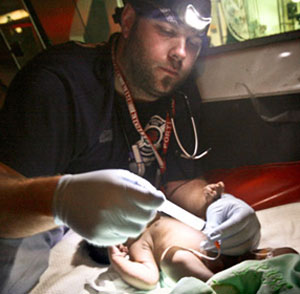 |
| Gavin Langille took this photo of Jeff Miller, a firefighter/paramedic from Portland, Oregon, while transporting an unstable infant in the back of a truck. The baby, with suspected malarial meningitis, needed further treatment in a better equipped hospital. (Photo by Gavin Langille) |
In February, I was fortunate to travel to Haiti as part of a team of almost 20 people including physicians, nurses and auxiliary staff from across the Maritimes. Three physicians practicing in New Brunswick were part of the team: Ravi Ramsewak (surgery), Colm McGrath (anesthesia/family medicine) and Mike Chandra (anesthesia/family medicine).
To see more of Gavin Langille's photos, click here.
Our team staffed the only clinic in Petit-Goâve, a coastal town west of Port-au-Prince with a population of 10,000. The destruction of the local hospital coupled with migration from rural areas resulted in our servicing a population of over 125,000. The makeshift outdoor clinic, set up by the Wesleyan church in an effort to deal with the vacuum of medical care facing the region, was processing several hundred patients per day.
“This was an outdoor clinic, whose layout changed as the needs and the staffing evolved— 400 patients per day, obstetrics, pediatrics, trauma, infectious disease and a collection of primary care problems were all part of the mix,” writes Dr. McGrath in a blog entry. “Our first day was incredibly intense, with penetrating chest trauma, cerebral malaria in a 12 month old, sepsis in a one month old, and an amputation on an elderly woman who had fractured her arm in the earthquake and only now had come in to be seen.”
From a medical perspective, working here was a rather taxing experience. Even those experienced with tropical medicine in developing nations would have to further a “rough and ready” approach while in Haiti. One had to adapt their role to the task at hand to keep the clinic running; this could mean working as a pharmacist, pediatrician and plumber within the same hour. Patients with complicated medical and surgical issues had to be managed with minimal resources; no bloodwork, no EKGs, no monitoring beyond a blood pressure cuff. Acute situations were often eerily silent; the usual mayhem of alarms in a Canadian hospital was replaced by the sound of distant ocean surf.
The people of Haiti are working tirelessly to rebuild their country and were incredibly appreciative of the assistance received from abroad. They are quite a resilient population despite the circumstances, as noted by the clean crisp clothes and bright white smiles of those who had traveled incredible distances to seek medical attention. This newly homeless population will face an unimaginably difficult time with the approach of the rainy season this spring. Despite a shift of international attention away from Haiti, the need for international support remains, and will indeed increase in the coming months and years.
Gavin Langille is a resident at Dalhousie studying surgery (urology). He has been a student at Dalhousie since 1999 when he started his undergraduate degree in biochemistry.
